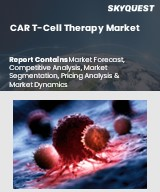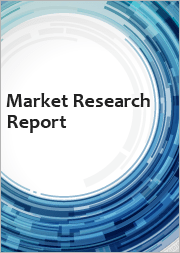
|
시장보고서
상품코드
1750227
암 감마 델타 T세포 치료 시장 : 시장 동향, 기술 플랫폼, 임상시험 전망(2031년)Global Gamma Delta T Cell Cancer Therapy Market Trends, Technology Platforms & Clinical Trials Outlook 2031 |
||||||
세계 암 감마 델타 T 세포 치료 시장 동향, 기술 플랫폼, 임상시험 전망(2031년) 보고서의 결론
- 임상시험 중인 암 감마 델타 T 세포 치료: 25개 이상의 치료법
- 가장 높은 개발 단계 : II/III 단계
- 2025년 6월 현재, 감마 델타 T세포 치료제는 시판되고 있지 않습니다.
- 미국과 중국이 감마 델타 T 세포 치료의 임상시험을 지배하고 있습니다. 20개 이상의 치료법
- 감마 델타 T 세포 치료 임상시험 인사이트: 기업, 국가, 적응증, 상별
- 감마 델타 T세포 치료 기술 플랫폼 기업별 인사이트: 15개 플랫폼 이상
- 감마 델타 T세포 치료 적응증별 시장 잠재력
적응형 감마 델타(Yδ) T세포 치료는 T세포의 고유한 하위 집합을 이용하여 암세포를 인식하고 파괴하는 새로운 유형의 면역치료법입니다. 일반적인 αβ(aB) T세포가 주요 조직 적합성 복합체(MHC) 분자에 의해 제시된 항원을 식별하는 반면, Yδ T세포는 MHC에 의존하지 않는 방식으로 스트레스 유도 리간드나 인산화 항원에 의해 활성화됩니다. Yδ T세포는 자연면역과 적응면역의 특성을 모두 가지고 있으며, 즉각적인 반응과 면역 기억 능력을 가지고 있어 상용화된 입양 세포 치료의 후보로 특히 적합합니다.
암에서 Yδ T세포는 기술적으로 어렵고 값비싼 종양 특이적 항원이나 유전자 변형 없이도 악성 세포를 파괴할 수 있는 가능성을 연구하고 있습니다. 이러한 본질적인 세포 손상성은(건강한 공여자로부터의) 동종 세포 이용 가능성과 함께 대량 생산이 가능하고 저렴한 치료법에 대한 접근성을 제공합니다. 현재까지의 임상 연구 개발의 대부분은 혈액 악성 종양에서 이루어지고 있으며, 특히 Yδ T 세포는 골수 및 기타 림프계 기관에 침입하여 사이토카인 방출, 직접적인 세포 독성 및 종양 미세 환경의 변화를 통해 종양에 영향을 미칠 수 있습니다.
특히 급성골수성백혈병(AML)과 같은 혈액암은 재발하기 쉽거나 기존 치료법에 내성을 보이는 경향이 있어 새로운 암 치료법에 대한 수요가 절실합니다. Yδ T세포 치료는 이러한 공백을 메울 수 있는 독보적인 위치에 있으며, 잠재적으로 효과적이고 안전하며, 자가 T세포 치료의 물류 문제(제조 보류, 환자 변동성 등)가 없는 기성품으로 제공될 수 있습니다. 가능한 기성품을 제공합니다.
TC Biopharm은 이 분야의 임상 개발을 선도하고 있습니다. 회사의 최첨단 제품 후보인 OmnImmune(구 TCB-002)은 암세포를 대상으로 한 매우 중요한 임상 II/III상 시험이 진행 중이며, 암세포를 빠르게 표적화하여 파괴하는 동시에 정상 조직에 손상을 주지 않도록 설계된 동종 Yδ T세포 치료제입니다. 암세포를 빠르게 표적하여 파괴하도록 설계되었습니다. 이 임상 프로그램은 전 세계 Yδ T세포 파이프라인 중 가장 진전된 프로그램 중 하나이며, TC바이오팜이 이 분야에서 리더십을 발휘하고 있음을 강조하고 있다"며 "OmnImmune 외에도 TC바이오팜은 다양한 암 적응증에 대한 Yδ T세포 후보물질을 개발하고 있다"고 말했습니다.
TC Biopharm의 가장 중요한 최근 동향 중 하나는 임상 2상 ACHIEVE 시험에서 조사 중인 TCB008 후보물질의 개발입니다. 회사는 2025년 6월, 이전에 재발한 MRD가 검출된 코호트 B의 첫 번째 환자가 두 번의 투여로 완전한 분자학적 관해에 도달했다고 보고했습니다. 치료 후 NPM1 전사체가 검출되지 않는 것은 깊은 지속적 반응을 의미하며, TCB008이 혈액암의 관해 후 치료제로서 유망하다는 것을 보여줍니다. 이번 성과는 Yδ T세포의 강력한 표적 면역 기능을 명확히 하고, 새로운 치료 전략으로서의 역할을 입증한 것입니다.
세계적으로 볼 때, Yδ T세포에 대한 조사는 대부분 혈액 악성 종양에 국한되어 있으며, 고형암을 대상으로 한 프로그램은 적습니다. 이는 고형암이 보다 정교한 미세환경과 면역회피 기전을 이용하기 때문이기도 합니다. 그러나 Yδ T세포 치료를 이러한 더 어려운 상황에 적용하려는 시도는 이루어지고 있습니다. 지역적으로는 미국에 기반을 둔 기업들이 Yδ T 세포치료제 시장을 독점하고 있으며, 그 뒤를 이어 중국 기업들의 수가 증가하고 있습니다. 이들 지역은 세포치료 시설과 기술에 많은 투자를 하고 있으며, 벤치에서 병상으로의 빠른 전환을 촉진하고 있습니다.
앞으로 Yδ T세포 치료의 전망은 밝지만, 고형암을 대상으로 한 임상 검증을 계속해야 합니다. 제조 기술과 바이오마커 기반 전략의 발전으로 Yδ T세포의 사용은 더 많은 유형의 암으로 확대될 수 있으며, TC Biopharm과 같은 선두주자가 선두에 서면서 이 분야는 암 분야의 중요한 미충족 수요에 대해 삶을 변화시키는 치료법을 제공하는 궤도에 오르고 있습니다.
목차
제1장 감마 델타 T세포 치료 서론
제2장 암 감마 델타 T세포의 역할
- 암 진행에서의 감마 델타 T세포
- 감마 델타 T세포 항종양 활성
- 감마 델타 T세포 치료에 채택 되고 있는 접근
제3장 감마 델타 T세포 치료 첨단병용 전략
제4장 감마 델타 T세포 치료 시장 개요
- 현재의 시장 시나리오
- 향후 연구개발과 상업 기회
- 감마 델타 T세포 치료 시장 잠재적 가능성
- 감마 델타 T세포 치료를 위한 기술 플랫폼
- 양호한 시장 성장 파라미터
- 향후 성장을 향해서 극복해야 할 주요 과제
제5장 세계의 감마 델타 T세포 치료 임상시험 개요
- 상별
- 국가별
- 기업별
- 적응증별
- 우선 현황별
제6장 세계 감마 델타 T세포 치료 임상시험 인사이트, 기업, 국가, 적응증, 상별
- 연구
- 전임상
- 제I상
- 제I/II상
- 제II상
- 제II/III상
제7장 백혈병 감마 델타 T세포 치료
- 진행중인 임상 연구개발 동향
- 백혈병 감마 델타 T세포의 향후 시장 기회
제8장 폐암 감마 델타 T세포 치료
- 진행중 임상 연구개발 동향
- 폐암 감마 델타 T세포 치료의 향후 시장 기회
제9장 유방암 감마 델타 T세포 치료
- 진행중 임상 연구개발 동향
- 유방암 감마 델타 T세포 치료의 향후 시장 기회
제10장 대장암 감마 델타 T세포 치료
- 진행중 임상 연구개발 동향
- 대장암 감마 델타 T세포 치료 향후 시장 가능성
제11장 췌장암 감마 델타 T세포 치료
- 진행중 임상 연구개발 동향
- 췌장암 감마 델타 요법 향후 시장 가능성
제12장 림프종 감마 델타 T세포 치료
- 진행중 임상 연구개발 동향
- 림프종 감마 델타 요법 향후 시장 가능성
제13장 뇌종양 감마 델타 T세포 치료
- 뇌종양 연구개발
- 뇌종양 감마 델타 요법 향후 시장 가능성
제14장 두경부암 감마 델타 T세포 치료
- 두경부암 연구개발
- 두경부암 감마 델타 요법 향후 시장 가능성
제15장 경쟁 구도
- Acepodia
- Adicet
- Appia Bio
- Cytomed Therapeutics
- Century Therapeutics
- Expression Therapeutics
- Immatics
- IN8bio
- JY BioMed
- Legend Biotech
- Luminary Therapeutics
- PhosphoGam
- Takeda
- TC Biopharm
- ViGenCell
Global Gamma Delta T Cell Cancer Therapy Market Trends, Technology Platforms & Clinical Trials Outlook 2031 Report Conclusions:
- Gamma Delta T Cell Therapies In Clinical Trials: > 25 Therapies
- Highest Phase Of Development: Phase II/III
- As Of June'2025 No Gamma Delta T Cells Therapy Is Commercially Available
- US & China Dominating Gamma Delta T Cell Therapies Clinical Trials Landscape: > 20 Therapies
- Gamma Delta T Cell Therapy Clinical Trials Insight By Company, Country, Indication and Phase
- Gamma Delta T Cell Therapies Technology Platforms Insight By Company : > 15 Platforms
- Gamma Delta T Cell Therapy Market Potential By Indications Based On Adoption Rates
Adoptive gamma delta (Yδ) T cell therapy is a novel type of immunotherapy that utilizes a unique subset of T cells to recognize and destroy cancer cells. While typical alpha-beta (aB) T cells identify antigens presented by major histocompatibility complex (MHC) molecules, Yδ T cells are activated by stress induced ligands and phosphoantigens in an MHC independent fashion. This enables them to detect and target a wide variety of tumor types, including those that are not targeted by conventional immune vigilance. Yδ T cells possess characteristics of both innate and adaptive immunity, allowing them to have the ability for immediate response and immune memory, which make them particularly good candidates for off-the-shelf adoptive cell therapies.
In cancer, Yδ T cells are under investigation for their potential to destroy malignant cells without the requirement of tumor-specific antigens or genetic modifications, which are technically demanding and expensive. Their intrinsic cytotoxicity, along with the possibility of allogeneic utilization (from healthy donors), provides access to the availability of mass producible, inexpensive therapies. The majority of clinical research and development to date has been in hematological malignancies, where they have been especially promising. Yδ T cells are able to penetrate the bone marrow and other lymphoid organs and exert tumor effects there through cytokine release, direct cytotoxicity, and changing the microenvironment of the tumor.
The demand for novel cancer therapies is pressing, especially in blood cancers like acute myeloid leukemia (AML), which tend to relapse or are resistant to conventional therapies. Options for patients who relapse following remission or who have residual disease (MRD) are limited, and prognosis is usually poor. Yδ T cell therapies are in a unique position to bridge this gap, providing a potentially effective, safe, and off-the-shelf product that can be delivered without the logistical issues of autologous T cell therapies, including manufacturing hold-ups or patient variability.
TC Biopharm is leading the way in clinical development in this area. The company's most advanced product candidate, OmnImmune (formerly TCB-002), is in a pivotal Phase 2/3 trial for AML. OmnImmune is an allogeneic Yδ T cell therapy engineered to quickly target and destroy cancer cells while avoiding damage to normal tissue. This clinical program is one of the most advanced in the global Yδ T cell pipeline, highlighting TC Biopharm's growing leadership within the domain. Besides OmnImmune, the company has a number of other Yδ T cell candidates in development for various cancer indications.
One of the most significant recent advances from TC Biopharm is the development of its candidate TCB008, which is under investigation in the Phase 2 ACHIEVE trial. The firm reported in June 2025 that the first patient in Cohort B, who had relapsed previously with detectable MRD, reached complete molecular remission following two doses. A lack of detectable NPM1 transcripts after treatment signifies a profound and lasting response, which identifies TCB008 as a promising post-remission therapy for blood cancers. This achievement demarcates the potent, targeted immune function of Yδ T cells and substantiates their role as a new therapeutic strategy.
Globally, most of the research studies on Yδ T cells remains on hematologic malignancies, and there are fewer programs directed at solid tumors. This is partly a result of the more sophisticated microenvironments and the immune evasion mechanisms utilized by solid cancers. However, attempts are being made to apply Yδ T cell treatments to these more difficult contexts. Geographically, US-based players dominate the Yδ T cell therapy market, followed by increasing numbers of Chinese firms. These regions have made heavy investment in cell therapy facilities and technology, facilitating quicker translation from bench to bedside.
Moving forward, the prospects for Yδ T cell therapy are bright but will necessitate continued clinical validation, most importantly in solid tumors. With advances in manufacturing technologies and biomarker-driven strategies, the use of Yδ T cells may extend to more types of cancers. With leaders such as TC Biopharm at the forefront, the field is on track to provide life changing treatments for critical unmet needs in cancer domain.
Table of Contents
1. Introduction To Gamma Delta T Cell Therapy
- 1.1 Emerging Role of T Cell Based Immunotherapies
- 1.2 Overview of Gamma Delta T Cell Therapy
- 1.3 Gamma Delta T Cell Therapy v/s Conventional Therapies
2. Role of Gamma Delta T Cells in Cancer
- 2.1 Gamma Delta T Cells in Cancer Progression
- 2.2 Anti Tumor Activity of Gamma Delta T Cells
- 2.3 Adopted Approaches for Gamma Delta T Cell Therapy
3. Advanced Combination Strategies In Gamma Delta T Cell Therapy
4. Gamma Delta T Cell Therapy Market Overview
- 4.1 Current Market Scenario
- 4.2 Future R&D & Commercial Opportunities
- 4.3 Market Potential of Gamma Delta T Cell Therapy Market
- 4.4 Technology Platforms For Gamma Delta T Cell Therapy
- 4.5 Favorable Market Growth Parameters
- 4.6 Key Challenges To Overcome For Future Growth
5. Global Gamma Delta T Cell Therapy Clinical Trials Overview
- 5.1 By Phase
- 5.2 By Country
- 5.3 By Company
- 5.4 By Indication
- 5.5 By Priority Status
6. Global Gamma Delta T Cell Therapy Clinical Trials Insight By Company, Country, Indication & Phase
- 6.1 Research
- 6.2 Preclinical
- 6.3 Phase I
- 6.4 Phase I/II
- 6.5 Phase II
- 6.6 Phase II/III
7. Gamma Delta T Cell Therapy In Leukemia
- 7.1 Ongoing Clinical Research & Development Trends
- 7.2 Future Market Opportunity of Gamma Delta T Cells In Leukemia
8. Gamma Delta T Cell Therapy In Lung Cancer
- 8.1 Ongoing Clinical Research & Development Trends
- 8.2 Future Market Opportunity of Gamma Delta T Cell Therapy In Lung Cancer
9. Gamma Delta T Cells In Breast Cancer
- 9.1 Ongoing Clinical Research & Development Trends
- 9.2 Future Market Opportunity of Gamma Delta T Cell Therapy In Breast Cancer
10. Gamma Delta T Cells in Colorectal Cancer
- 10.1 Ongoing Clinical Research & Development Trends
- 10.2 Future Market Potential of Gamma Delta T Cell Therapy in Colorectal Cancer
11. Gamma Delta T Cells In Pancreatic Cancer
- 11.1 Ongoing Clinical Research & Development Trends
- 11.2 Future Market Potential of Gamma Delta Therapy In Pancreatic Cancer
12. Gamma Delta T Cells In Lymphoma
- 12.1 Ongoing Clinical Research & Development Trends
- 12.2 Future Market Potential of Gamma Delta Therapy In Lymphoma
13. Gamma Delta T Cell Therapy In Brain Tumors
- 13.1 Research & Development In Brain Tumors
- 13.2 Future Market Potential of Gamma Delta Therapy In Brain Tumors
14. Gamma Delta T Cell Therapy In Head & Neck Cancer
- 14.1 Research & Development In Head & Neck Cancer
- 14.2 Future Market Potential of Gamma Delta Therapy In Head & Neck Cancer
15. Competitive Landscape
- 15.1 Acepodia
- 15.2 Adicet
- 15.3 Appia Bio
- 15.4 Cytomed Therapeutics
- 15.5 Century Therapeutics
- 15.6 Expression Therapeutics
- 15.7 Immatics
- 15.8 IN8bio
- 15.9 JY BioMed
- 15.10 Legend Biotech
- 15.11 Luminary Therapeutics
- 15.12 PhosphoGam
- 15.13 Takeda
- 15.14 TC Biopharm
- 15.15 ViGenCell



















